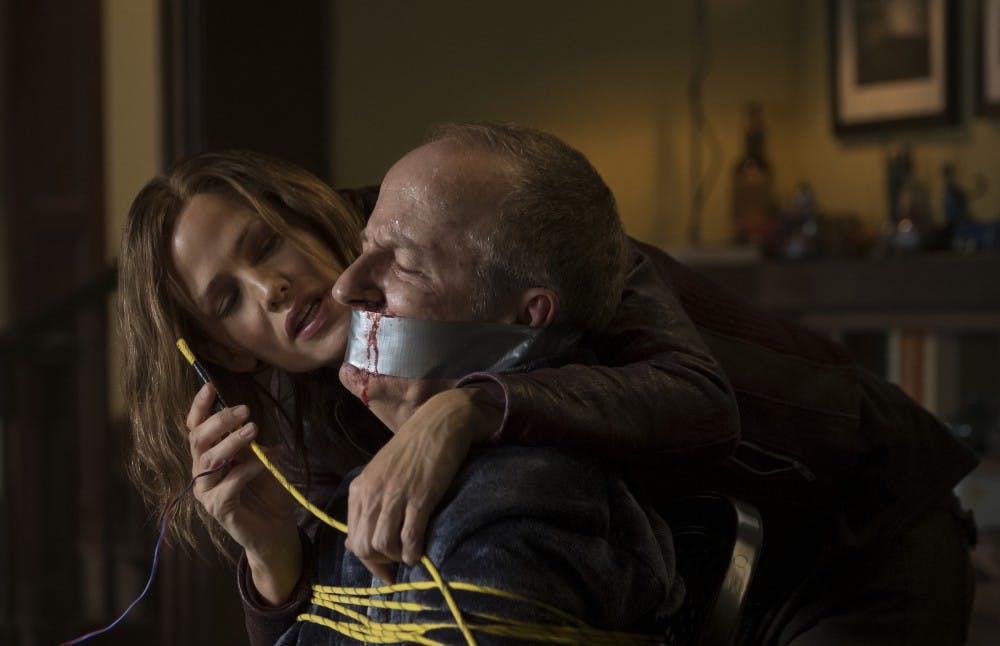A recent action release, Peppermint centers around Riley North, a middle–class suburban mother who watches her husband and her daughter get killed in a drive–by. After the justice system fails to capture those who harmed her, she disappears for five years to train and comes back as a revenge–seeking vigilante. The movie is very reminiscent of the early 2000s, when Jennifer Garner was starring as a leading badass in terrible movies like Daredevil, Elektra, and Alias. But don’t worry, Peppermint is much worse.
Peppermint is a sad excuse for a vigilante film. It sets the main character up for sympathy and appeal by painting her as a hard–working, relatable middle–class woman who loses her center of gravity, her family, and is now looking for retribution. She defends kids, she’s really bad–ass, and she is driven by a hallucination of her dead daughter. The movie literally forces you to root for her, yet it never really pays it off. Because of the five year gap from the time of her family’s murder to her return to LA for justice, she shifts from soccer mom to FBI–evading guardian angel of Skid Row, and we only lightly hear about it in passing. We don’t even get to see her kill the men that shot her family, we only get to see them dead.
The movie builds conflict with the lawyer who defended her attackers by emphasizing his sleazy, money–centered persona which physically makes me uncomfortable; yet it is never paid off. Instead, we hear about his death over a cop’s radio. This movie isn’t about her character development or her fight for personal justice; it’s an action film that’s so removed from any personalization that I almost lose the sympathy that was forced on me by the director in the first place.
There is one scene in particular that really stood out to me. After killing the shooters and the lawyer, North goes after the judge that cleared the sentencing. She has him tied up and attached to a bomb, and while she tortures him, she says something along the lines of, “If you can tell me my name, you get to live.” That’s the moment I realized that I definitely didn’t know her name and that I would be dead because this film doesn’t care about making something actually enjoyable or worth watching.
Instead, the film brings back terrible stereotypes of drug cartels and Latinx populations in LA that were prevalent in the '80s or early 2000s. If they wanted to do drugs right, the director should’ve watched Breaking Bad or Dexter—TV shows that emphasize this culture without offending. If there is one thing I learned from this movie, it’s that having a mustache makes you evil.
The camera work feels sloppy, the delivery of lines is garbage, and the big twists and turns of dirty cops are underwhelming. Overall, I felt like I was watching a dark comedy, rather than the chilling thriller by the director of Taken that I was promised. The delivery of some lines lacked so much emotion that it was seriously comical. The villains felt cartoonish in their terrible outfits, and the piñata store they used as a coverup for a drug business was beyond stereotypical—it was racist (I’m allowed to be mad, I’m from LA).
If there was one positive in this film, it was Jennifer Garner. The problems of this movie lie in the writing, in the directing, and in the acting of the other characters. Garner’s performance as Riley North was really powerful, and it’s obvious through her complete body transformation and through her acting as a mother who lost it all. She plays so much emotion into her scenes that it’s almost not fair that her character was written without depth and that the rest of the movie was lacking in care.
Sorry Jennifer Garner, action films just haven’t been for you.

